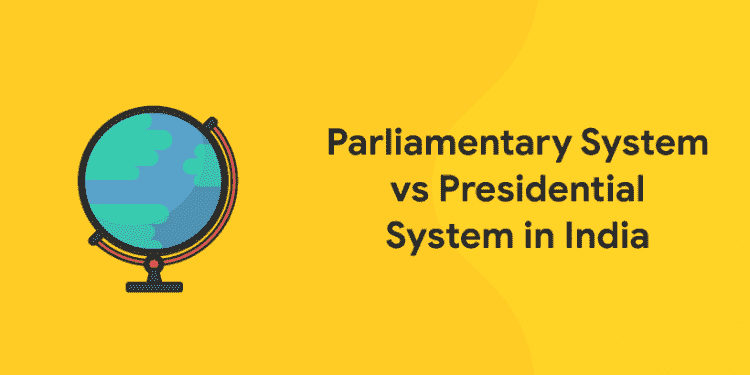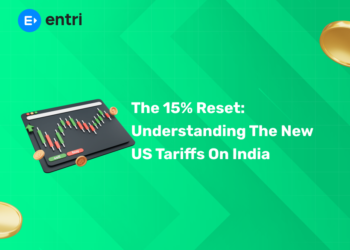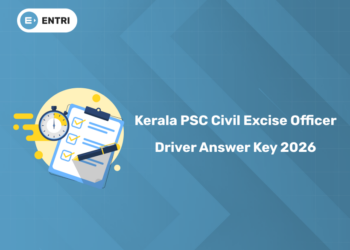Polity is an inevitable topic of all-important competitive examinations like UPSC, state-level PSCs’, SSC, Bank, RRB etc. Among that, forms of the government and the constitution articles related to that are equally important. In this article, let us check the merits and demerits of both Parliamentary and Presidential forms of government. The main difference is in the method of electing the head of the country. The Parliamentary form, followed by in India based on Britain was chosen by our constitution framers, considering our diversities. So, know more about Parliamentary System vs Presidential System in India.
Get the Weekly Current Affairs notes for Competitive examinations.

Parliamentary System vs Presidential System in India
Features: Parliamentary System vs Presidential System
The features of both these systems are as follows:
-
Parliamentary System
Occupies dual executives. The nominal executive is the head of state- President while the real executive is the Prime Minister, who is the head of government along with the cabinet exercises effective power. The executive is responsible to the legislature for its policies and acts.
Examples include Germany, Italy, Japan, United Kingdom.
The Constitution of India provides for a parliamentary form of government, both at the Centre and in the States. Articles 74 and 75 deal with the parliamentary system of government at the Union level and Articles 163 and 164 contain provisions with regard to the States.
-
Presidential System
There is Only one executive- President – head of both the state and government. Examples include the USA, South Korea. The executive is not responsible to the legislature for its policies and acts. And it is constitutionally independent of the legislature in respect of its term of office. President can veto laws or acts passed by the Legislature. The president (directly elected by the people) has the power to pardon or reduce judicial penalties given to criminals.
| Parliamentary System | Presidential System |
| Dual Executive or Bicameral Legistaure- The executive is responsible to the legislature
Majority party rule Collective Responsibility Political Homogeneity Double Membership The leadership of the Prime Minister Lower House is opened for dissolution The fusion of powers Secrecy of Parliamentary procedures More responsible form of Government |
Single executive-not responsible to the legislature
President and legislators elected separately for a fixed term Non- Responsibility Elections are held more frequently Single Membership Domination of president with quasi-judicial powers No dissolution of the lower house possible Separation of powers-legislature, executive and judiciary functions separately and are constitutionally independent |
Practice Rank-booster GK Quizzes on Entri.
Merits and Demerits
Merits of Presidential System
- There is a separation of powers. The efficiency of administration is enhanced as the three arms of the government- legislature, executive, and judiciary- are independent of each other.
- The executive need not be legislators, the President can choose experts in various fields to head relevant departments or ministries. And makes sure that people who are capable and knowledgeable form part of the government thus forming an expert panel in government.
- The term of the president is fixed and not subject to majority support in the legislative, there is no worry of losing the government. There is no danger of a sudden fall of the government, no political pressure on the president to make decisions leading to a somewhat more stable form of government.
- Less influence on the party system.
Indian Constitution-Important Questions for Competitive Exams.
Demerits of Presidential System
- The legislature has no hold over the executive and the president, the head of the government can turn as an authoritarian leading to a less responsible executive.
- There is a more strict separation of powers between executive and legislature, there can be frequent scuffles between both arms of the government, especially of the legislature which is not dominated by the president’s political party. And may lead to an erosion in the efficiency because of wastage of time.
- Lack of flexibility. Presidential systems are often blamed for being rigid.
- The Presidential system gives the president sweeping powers of patronage. President can choose executives as per his wish. This may spoil the system where people close to the president get roles in the government.
Check the Links:
Merits of Parliamentary System
- The executive is a part of the legislature, and generally, the majority of the legislature supports the government, which in turn makes easier coordination to pass laws and implement them.
- Here, the executive is responsible to the legislature, and the legislature can vote it out in a motion of no confidence, there is no authoritarianism. Also, power is not concentrated in one hand.
- The members of the legislature can ask questions and discuss matters of public interest and put pressure on the government. The parliament can check the activities of the executive and question, which makes the executive more responsible.
- In this system, the parliament offers representation to diverse groups of the country. For the same reason, our constitution took a Parliamentary system.
- There is flexibility in the system as the PM can be changed easily if needed. This is unlike the presidential system where he/she can be replaced only after the entire tenure or in case of impeachment.
Attempt more Quizzes on Polity and Current Affairs topic.
Demerits of Parliamentary System
- There is no separation of powers as the legislature cannot always hold the executive responsible. This is especially true if the government has a good majority in the house. Also, because of anti-defection rules, legislators cannot exercise their free will and vote as per their understanding and opinions. They have to follow the party whip.
- The system creates legislators whose intention is to enter the executive only for gains. They are largely unqualified to legislate.
- Instability of the government arises as the governments sustain only as long as they can prove a majority in the house. There is instability if there is no single-majority party after the elections. Coalition governments are generally quite unstable and short-lived. And for the same reason, the executive has to focus on how to stay in power rather than worry about the state of affairs/welfare of the people.
- The executive should belong to the ruling party by which the industry experts are ruled out.
- No fixed tenure for the Council of Ministers, it often hesitates from taking bold and long-term policy decisions.
- Party politics is more evident in the parliamentary.
- The system is more or less controlled by the bureaucracy. Civil servants exercise a lot of power in this system.
Take more notes from Polity for Upcoming Exams.
Download Entri for more details regarding competitive examinations.












